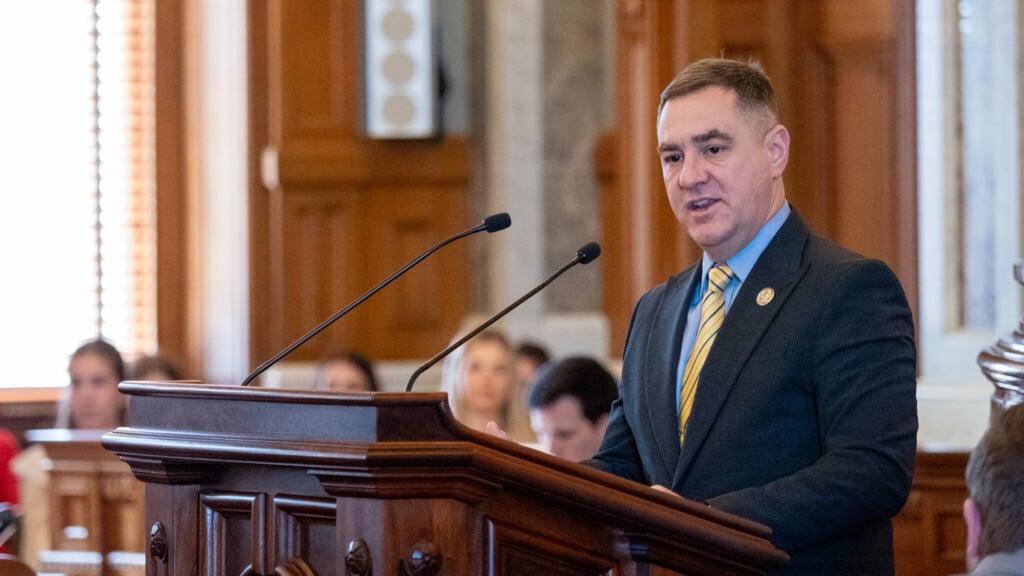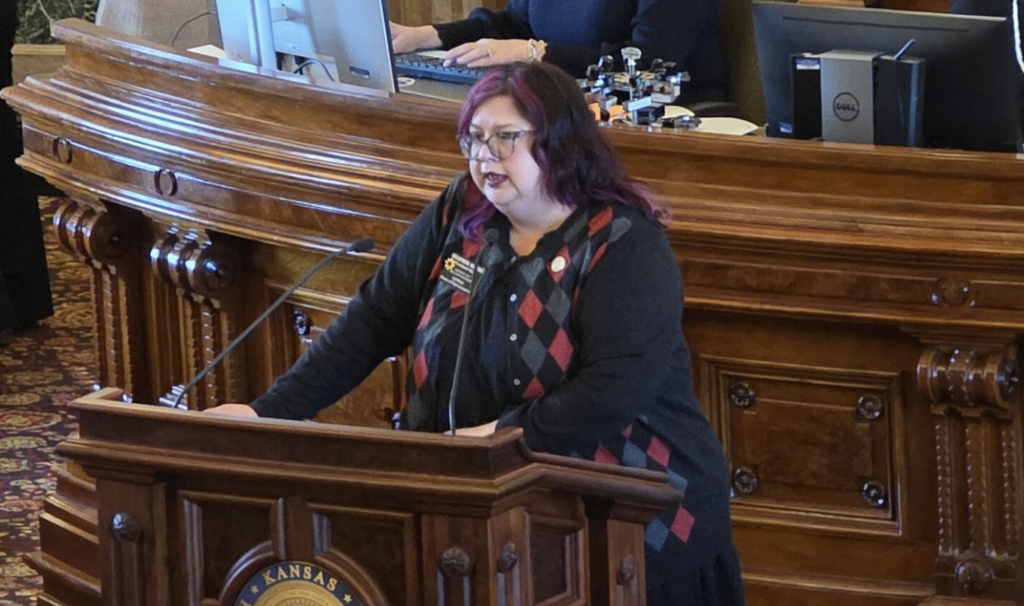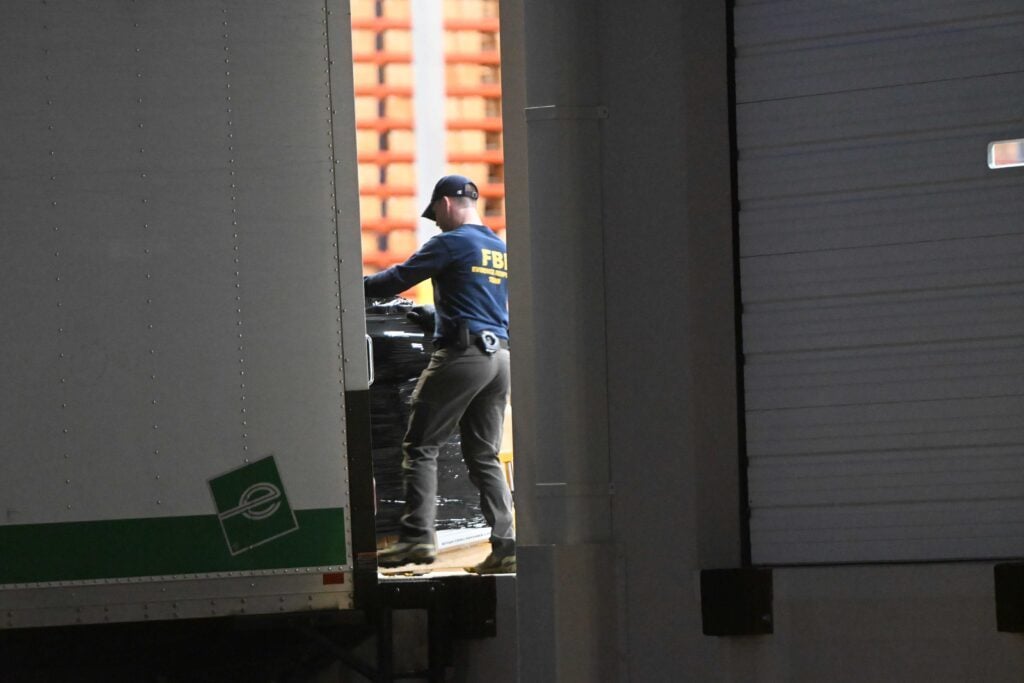Missouri House passes gerrymandered congressional map, limits on initiative petitions
Both bills now head to the Missouri Senate, where Democrats are expected to use the filibuster and other procedural maneuvers to gum up legislative business as much as possible.

House Speaker Jon Patterson presides over the final day of the 2025 legislative session on May 15. // (Tim Bommel/Missouri House Communications)
Bills creating a gerrymandered congressional map and making it virtually impossible to change the state constitution through the initiative petition process are on their way to the Missouri Senate.
The Missouri House gave final approval to both proposals Tuesday after two days of contentious debate.
Gov. Mike Kehoe called the legislature back into session after weeks of pressure from the President Donald Trump for GOP-run states to redraw congressional districts to ensure more Republican seats before next year’s midterm elections.
In Missouri, the effort targeted the 5th District, currently held by Democratic U.S. Rep. Emanuel Cleaver of Kansas City, by carving it up and dispersing its voters into three districts that give Republicans an electoral advantage in seven of the state’s eight congressional districts.
“This is a superior map,” said state Rep. Dirk Deaton, a Noel Republican sponsoring the proposed new congressional map. “It better represents the state of Missouri.”
In addition to the gerrymandered map, Republicans also took aim at the citizen initiative petition process. The House approved a plan Tuesday that would require constitutional amendments put on the ballot by Missouri voters to attain both a simple majority statewide and a majority in all eight congressional districts in order to pass.
Based on last year’s election results, that change would mean as few as 5% of voters could defeat any ballot measure. The proposal would also ban foreign contributions to initiative petition campaigns, something that is already illegal.
If it passes the Senate, the issue would go on the statewide ballot in 2026 and require a simple majority to approve.
State Rep. Ed Lewis, a Moberly Republican, said amending the state constitution has become too easy and has been dominated by out-of-state interests. His proposal, he said, would address both of those issues.
“There should be a broad consensus across the state to amend the constitution,” he said.
Democrats denounced both of the proposals as a power grab by the Republican supermajority and a Trump-inspired assault on democracy.
“The Missouri GOP is aiding and abetting the systematic destruction of our democracy by an authoritarian regime led by geriatric conman who knows the only way he can win is to cheat,” said House Minority Leader Ashley Aune, a Kansas City Democrat.
GOP state Rep. Bryant Wolfin of Ste. Genevieve was one of the few Republicans who voted against both measures, saying this week’s special session proves that the only thing that matters in the Missouri Capitol is “political power.”
“Unfortunately, it’s not ethics,” he said. “It’s not morality. It’s definitely not liberty. It’s just political power.”
If Democrats were in charge, Wolfin, said, he’s sure they would do the same thing. But that doesn’t justify what Republicans are doing.
“There’s certainly nothing conservative about ignoring the moral implications of our actions,” he said. “Morality is not defined by what is legal. Morality is not defined by what you can get away with.”
Gerrymandering
Revising congressional district lines occurs every 10 years, after the allocation of seats following the federal census. The Missouri Constitution mandates it but is silent on whether lawmakers have the power to do so at other times.
Democrats argue it is unconstitutional to draw another map before the next census is complete.
The Missouri NAACP filed a lawsuit last week in Cole County arguing the governor’s decision to call a special session was unconstitutional. Cleaver has also promised to go to court to challenge any gerrymandered map lawmakers approve.
But Republicans say critics are misreading the constitution and are confident the new map would survive a legal challenge.
“The constitution is clear that we can alter districts as we desire at any point at any point,” Deaton said.
Legislators were elected to represent the people, Deaton said, and if a majority of legislators vote in support of the map “that’s representative democracy.”
The new map does not include an emergency clause that would have made it go into effect upon Kehoe’s signature. That means opponents of the map will have 90s days after it is signed into law to collect signatures to force a statewide vote.
St. Louis Public Radio reported Monday that the Missouri AFL-CIO is considering whether to launch a petition drive to force a referendum vote. If enough signatures are gathered before the law takes effect, it would be held in abeyance until after the vote.
That strategy was last deployed in 2018, when labor unions collected more than 300,000 signatures in 90 days — more than three times the amount needed — to put a question on the statewide ballot repealing a GOP-backed right-to-work law.
The repeal push was ultimately successful, with 67% of voters rejecting the right-to-work law.
In fact, of the 27 times a referendum has been placed on the ballot, voters have rejected actions by the General Assembly all but twice.
Constitutional amendments
Missouri is one of 24 states that allows citizen initiative petitions. They can be used to either amend the constitution or change state law, though the path to successfully doing so is often arduous and expensive, requiring tens of thousands of signatures to even land on the ballot.
Missourians in recent years have used the initiative petition process to legalize abortion and recreational marijuana use, as well expand Medicaid eligibility.
In November, the abortion-rights amendment passed with just shy of 52% of the vote driven by large support from the state’s urban, more-populated areas. Voters in all but eight of Missouri’s 115 counties opposed the amendment.
Lewis argued Tuesday that the process is dominated by liberal, out-of-state organizations who are pushing partisan amendments that would be impossible to pass through the Republican-dominated legislature.
“Do you want partisan things going into the constitution,” Lewis said, “or do we want something that a broad consensus of all Missourians could support.”
State Rep. Martin Jacobs, a Democrat from Liberty, questioned why the process should be changed to allow a fraction of voters to sink an initiative petition, arguing it violates the principle of one person, one vote.
“Voters in one district can override voters of every other district,” Jacobs said.
Based on last year’s general election, where 2,960,266 votes were cast for governor and only 311,915 in the 1st District, under the proposed change only 156,000 voters could defeat ballot question — or just shy of 5.3% of the statewide vote.
The GOP-backed legislation “rigs the system,” said Democratic state Rep. Kathey Steinhoof of Columbia, “and I assure you all Missourians on both sides of the aisle are tired of the system being rigged.”
On to the Senate
Both bills now head to the Missouri Senate, where Democrats are expected to use the filibuster and other procedural maneuvers to gum up legislative business as much as possible.
In order to overcome the gridlock, Senate Republicans may once again have to break a filibuster and force a vote by turning to a rule that was previously rarely-used but got deployed twice during the regular legislative session in May.
Doing so would create even more bad blood in a legislative chamber already teetering on the edge of full on partisan collapse. It could also upend the 2026 session before it even gets started.
Republican leaders in the Senate are determined to push both measures across the finish line.
“The map and the initiative petition reform measures will strike a huge blow to progressives and their efforts to turn Missouri into California,” Senate President Pro Tem Cindy O’Laughlin, a Shelbina Republican, posted on social media. “We are not California. We are not progressives.”
Missouri Independent is part of States Newsroom, a nonprofit news network supported by grants and a coalition of donors as a 501c(3) public charity. Missouri Independent maintains editorial independence. Contact Editor Jason Hancock for questions: info@missouriindependent.com.




